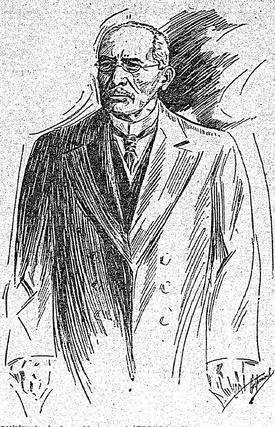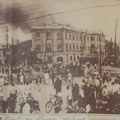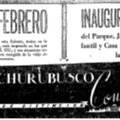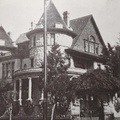Pablo Imai did not move a muscle during his trial, in the jury room of the Belén Courthouse, for charges of homicide with the aggravating circumstances of treachery, premeditation and advantage. Upon hearing his death sentence, he turned to the courtroom secretary, Manuel Lozano y Castro—who had read the jury's resolution—and with a slow movement he bowed his head toward him, showing his acceptance. The murmurs of the audience coincided with the apparent attitude of calm and serenity of the accused. According to the newspaper El Diario, it was the first time that a Japanese person in Mexico City was accused of this crime and subject to the death penalty.
The news had great coverage in the Mexican press. The newspapers El Imparcial , El Diario , Correo Español , The Mexican Herald and El País followed up on the events of the Pablo Imai case, at a time when the government of Victoriano Huerta—who had overthrown President Francisco I. Madero, after the military coup that took place from February 9 to 19, 1913—and that sought to cling to power in a climate of virtual international isolation. President Woodrow Wilson did not recognize the military regime, but Japan did not align with White House policy. From the perspective of the geopolitical game between Tokyo and Washington, Mexico was an important player. The new Minister of Japan in Mexico, Mineichiro Adachi, saw an opportunity and made an effort to show closeness with the dictator Huerta to negotiate issues such as the resumption and expansion of migratory flows to Mexican territory in the face of the restrictions of the “Gentlemen's Pact” of 1907. , but particularly in light of the anti-Japanese measures in California, within the framework of the “Alien Land Act” (May 1913) which stipulated the prohibition for Japanese residents—ineligible to obtain citizenship—from having the possibility of purchasing lands in that state of the American Union.
Pablo Imai arrived from Japan to the port of San Francisco together with José (the press refers to his last name as “Yamatosy”, “Yamakisy” or “Yamagnesi”) and Luis Kobayashi in 1909. After a stay in that city they decided to emigrate to the South . El Diario reports that they did not “agree with American customs,” but the truth may have been that they witnessed the resurgence of xenophobic actions against the Japanese in California. In the end, they arrived in Mexico City and lived in the “La Asunción Colhuacatzinco” neighborhood (founded on January 11, 1883), belonging to the then town of Xochimilco.
Pablo, José and Luis, accustomed to work, were later able to buy land for raising livestock and agriculture. The business flourished and apparently the partnership of the three friends was paying off. The money was enough not only to support the three of them, but also to increase their savings in the bank. However, the apparent harmony hid other very deep desires. In the early hours of July 24, 1913, the inhabitants of La Asunción witnessed horror and panic in their peaceful rural community.
A day before, José had gone to the bank to withdraw 550 pesos, of the 2,000 pesos he had deposited in a savings account. The majority of that capital, according to El Diario , belonged to José, perhaps for that reason he had greater capacity for decision-making and management of finances. Returning to his small ranch, he told his partners that he wanted to buy the adjacent land so he could plant more and have more products for sale. Luis, immediately, was in favor, but Pablo was not so enthusiastic about that idea.
El Imparcial narrates that that same day at night there was a verbal fight between Pablo and José. Imai demanded that they divide the money between the three of them, to which José flatly refused. For a couple of hours, Pablo was thinking about what to do and, first of all, it occurred to him to use morphine to make José sleep deeply; But, he realized that he had very little amount. So he came up with another plan. At two in the morning, he stealthily approached José while he was sleeping, jumped on him and subdued him, managing to put the barrel of the gun on his forehead and fired a shot. Joseph died instantly.
At the sound of the detonation, Luis stood up immediately. The neighbors also ran towards the house and Pablo shouted at them: “It was the Zapatistas”; That is, Emiliano Zapata's troops had entered his property and, in order to steal their money, they killed his friend. The news spread quickly throughout the town, which went into shock and fear took over its inhabitants. The police arrived at the scene, seeing José's body lying on his bed and with the bags empty: the 550 pesos had disappeared. Luis knew perfectly well that the version of events narrated by his friend Pablo was not the true one, but he remained silent.
In the absence of evidence that the Zapatistas had committed the crime, the authorities did not believe Imai's version and took him away for questioning. Pablo repeatedly denied being guilty of José's death, but Luis confessed and stopped covering up for his friend. After a careful search of Pablo's belongings, they found the money inside the linings of his pants.
Given this clear evidence, he was formally imprisoned and had to wait a couple of months for his trial in Belén prison. The agent of the Public Ministry, Adolfo Fenochio—attached to the court of first instance of Xochimilco—at the conclusion of the investigation, requested the death penalty against the accused. Upon hearing the news, Pablo delegated his defense to the young lawyer Alfonso de la Peña y Reyes. During the trial presided over by Judge Belisario Cicero, prosecutor Fenochio endorsed his accusation of qualified homicide and the defense failed to convince the jury—which deliberated for almost an hour—of his client's innocence. On November 22, 1913, Imai was found guilty. Alfonso de la Peña y Reyes immediately appealed the sentence to the Superior Court of Justice.
Remorse gripped Imai and he initially stoically accepted his sentence. However, his lawyer convinced him to continue the process before the nation's highest court. However, the Superior Court of Justice endorsed the guilty verdict at the beginning of February 1914, despite the request for clemency by some members of the Japanese colony in Mexico City. The news did not surprise Pablo and his defender sent a formal letter to the dictator Victoriano Huerta, requesting a presidential pardon for Pablo. He did not have to wait long and on March 4, 1914 he received a positive response from the Mexican executive: the death sentence was commuted for the convicted man in exchange for serving an extraordinary sentence of 20 years in prison. The news caused a great surprise in public opinion, and surely in Pablo himself and his lawyer, who immediately sent a letter to President Huerta thanking him for his intervention.
It is clear that Huerta's decision was not a simple act of mercy for a murderer. Pablo's trial took place within a very particular political situation in Mexico, in which the “Huertista” government sought at all costs to remain in power and repress the growing opposition of Venustiano Carranza, Álvaro Obregón and Pacho Villa in the north and Emiliano Zapata in the south of the country. In this context, the diplomatic efforts of Japanese Minister Adachi to resume migratory flows from Japan to Mexico would have been called into question due to the execution of the capital punishment for one of his compatriots. The constructed image and perception of the industrious, hard-working and law-abiding Japanese would have been called into question when José's murderer was executed. For his part, Huerta wanted to conclude the negotiation of the sale of weapons promised by Japan in the face of the North American blockade of his government, so it was not appropriate for his strategic interests to give negative signals to Tokyo, killing one of his migrants who had came to settle in Mexico City. The Dictator's pardon did not exonerate Pablo of his crime, since he had broken the law, but it gave him a sentence that he could serve in life and gave him plenty of time to answer himself why he had deprived Joseph of Joseph's life in a burst of anger and ambition.
© 2017 Carlos Uscanga






